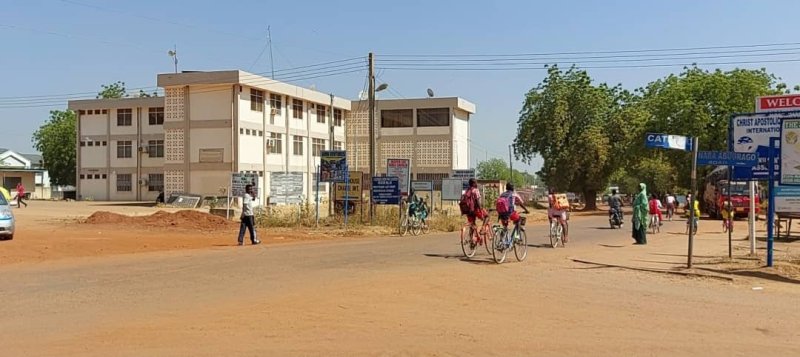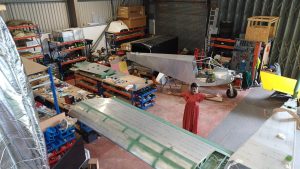
By Bryan Acheampong
Full text of a speech delivered by Bryan Acheampong (Dr), Member of Parliament for Abetifi recently at the University of Media, Arts and Communication (UniMAC), themed “AI Disruptions and the Future of Work: Readiness of our Youth.” The event, which drew academics, students, industry professionals, and policymakers, was part of the University’s Distinguished Speakers Series.
Before I begin, allow me to share a fun fact. In 2014, I completed a certificate programme in Public Relations, Advertising, and Marketing right here at the Ghana Institute of Journalism. So, in a sense, I am back home—only this time with no hair and a PhD in Information Systems.
I often wonder: what if AI had been as powerful and accessible then as it is today? I might have asked ChatGPT to help me write my PR briefs or used machine learning to analyse campaign impact. But here we are, at a moment when what once seemed futuristic is now fundamental. And that’s why today’s conversation is so important.
Globally, algorithms are now shaping decisions across sectors. In healthcare, AI is enabling early disease detection through diagnostic imaging and predictive analytics (IBM, 2021). In transportation, cities like Singapore have deployed AI to manage traffic and optimize public transport (Singapore Land Transport Authority, 2022).
Financial institutions use AI to detect fraud, automate credit scoring, and enhance customer service (McKinsey, 2023). Education systems apply adaptive learning algorithms to personalize content (Khan Academy, 2023).
In agriculture, AI-driven models are forecasting weather and improving yield efficiency (Smart Africa, 2025). National security agencies also leverage AI for cyber threat intelligence and surveillance (Dandamudi et al., 2025).
Across the globe, nations are asking a central question: how will AI redefine work, and what must we do to ensure no one is left behind?
After reading several reports and data on AI, I decided to do something simple, but revealing. I picked up the phone and called my nephew, who is currently in school. I asked him, “What do you and your friends think about AI and work after school?”
He didn’t hesitate.
“Uncle Bryan,” he said, “AI is nice but it can do everything now. What’s going to be left for us? We’re afraid we’ll finish school and still end up jobless because robots will be doing the work.”
His response struck a chord, and not because he was wrong to worry. In fact, that fear is increasingly common among young people, not only in Ghana but around the world. I’ve heard similar concerns from university students, junior staff in ministries, even fresh graduates.
And yes, it’s true: AI is automating many tasks we once thought only humans could do. It’s writing reports, designing graphics, analysing data, even diagnosing diseases. So the anxiety is valid.
But here is what I told my nephew, and what I want to tell all of you today.
AI may change jobs, but it does not erase human value. It replaces tasks, not people. It automates routine—but it also amplifies creativity. The future doesn’t belong to machines. It belongs to humans who know how to work with machines.
Instead of seeing AI as a threat, we must see it as a tool to extend our capabilities. You may not need to memorise long reports anymore—but you’ll need to know how to ask better questions, interpret AI outputs, and think critically about solutions. You may not need to manually sift through pages of data—but you’ll need to know how to tell meaningful stories from the insights AI gives you.
That’s where the real opportunity lies: in developing skills that machines cannot replicate—like emotional intelligence, ethical reasoning, communication, collaboration, and creative problem- solving. These are the “irreplaceable” human skills that will define leadership in the AI age.
And for those of you with an entrepreneurial mindset, the prospects are even more exciting. AI lowers the cost of starting a business, speeds up product development, and enables you to serve global clients from your dorm room. You don’t need a 10-person team to build a brand—you just need curiosity, strategy, and access to AI tools.
So I say to every student here: don’t be afraid of the robots. Master them. Use them. Leverage AI not to diminish your potential—but to multiply it. Let AI make you more efficient, more innovative, and more competitive.
The future of work is not about who gets replaced. It’s about who gets ready.
We are a country of young minds, of untapped potential, and of extraordinary resilience. But we are also a country facing widening skills gaps, a public sector stretched thin, and institutions still grappling with digital transformation. As someone who has served in public office and also studied the adoption of intelligent systems in institutional environments, I am convinced that we cannot afford to be passive in this moment. The challenge before us is not whether we will use AI, but whether we will lead it, shape it, and deploy it to serve Ghanaian lives and livelihoods.
I have devoted significant time to explore the intersection of trust, institutional responsiveness, and technology adoption through multiple lenses; education, governance, and public service transformation. These studies reveal that the success of AI and digital innovation is not simply determined by technical functionality, but by how well people and institutions are prepared to engage with these tools.
Regarding technological trust, my co-authored study or publication in 2023 on the acceptance of ChatGPT in education (Ofosu-Ampong et al., 2023), found that trust is the bedrock of technology adoption among students. Trust was not derived from mere exposure to AI tools, but rather from the perceived usefulness, transparency, and ethical clarity surrounding their use. Students were more willing to engage with AI platforms when they could clearly understand their purpose, see alignment with their learning goals, and feel assured that the tools respected their autonomy. This implies that trust in AI is not just psychological—it is structural, shaped by communication, user experience, and value alignment. For Ghana, building trust means involving users early, ensuring algorithmic fairness, and demystifying AI through inclusive dialogue.
Concerning institutional responsiveness, institutional responsiveness speaks to the ability of government bodies, ministries, and agencies to respond strategically and ethically to technological change. In my 2020 work on integrated financial management systems (Acheampong & Bedi, 2020), we argued that reforms often fail because they are driven by external pressure or technical trends, not institutional understanding. When interoperability initiatives were introduced without deep engagement with end-users—civil servants, auditors, local managers—systems became underutilised or even rejected. This shows that institutions must be adaptive, communicative, and learning-oriented. Responsiveness includes having feedback mechanisms, change management protocols, and cross-functional leadership teams that can align digital goals with public values.
Regarding AI Adoption in Education and Governance, the adoption of contactless technologies during the COVID-19 period, which I studied using the Technology–Organisation– Environment (TOE) framework (Ofosu-Ampong & Acheampong, 2022), highlighted that adoption is multi-dimensional. It is not just about having the right technology (e.g., AI tools), but also about organizational readiness (e.g., leadership support, policy clarity), and external factors (e.g., infrastructure, regulations). This model is critical for AI in both education and governance: institutions must not only invest in tools, but also in strategic frameworks that support uptake, training, and alignment with mission goals. In the public sector especially, my research suggests that successful adoption is contingent on mutual understanding among stakeholders, as explored in my work on platform interoperability (Boateng, Acheampong & Bedi, 2019). Silos must be broken. Policy, IT, and operational departments must co-design digital solutions—not simply implement them in sequence
Today, I want to speak with you about how Ghana can empower the youth to embrace AI for work, how Ghana can build an intelligent job creating economy grounded in three strong pillars: trust in systems, adaptable human capital, and institutional readiness. The goal is not just to embrace artificial intelligence, but to use it to unlock real economic value—for our farmers, our youth, our entrepreneurs, and our public institutions.
Let us now examine where we stand, and where we must go.
- Situating Ghana in the Global AI Economy
AI now writes, speaks, predicts, trades, diagnoses, translates, and even paints. It is a tool of cognitive augmentation and creative expression (MIT Technology Review, 2023; World Economic Forum, 2023).
Even closer to home, Rwanda has launched a national AI policy and is integrating AI into healthcare diagnostics and agricultural planning (Sangwa et al., 2025). These developments raise an important question for us: where does Ghana stand in this rapidly changing landscape?
To be honest, our position is not yet defined. Ghana has made admirable strides in digital inclusion—we have improved internet penetration, made significant reforms in mobile money infrastructure, and launched the Ghana Card as a biometric foundation for digital identity.
In the transportation sector, ride-hailing platforms such as Uber and Bolt have significantly disrupted the traditional taxi industry. These AI-driven platforms use algorithms to match drivers with passengers, calculate dynamic pricing based on demand, and optimize routes in real-time— changing how mobility services are accessed and monetized in urban Ghana (Kwateng, 2021).
In the education sector, the introduction of ChatGPT and other AI-powered learning assistants is altering how students research, write, and interact with academic content. As highlighted in my own research, students in Ghanaian tertiary institutions are using AI tools to draft essays, simulate arguments, and generate content outlines—often bypassing traditional methods of inquiry (Ofosu- Ampong et al., 2023). This shift challenges educators to rethink assessments, uphold academic integrity, and integrate AI literacy into curricula.
In retail and commerce, companies like Hubtel are leveraging AI for personalised advertising, inventory predictions, and customer support. Chatbots and recommendation engines are becoming standard, reducing the need for traditional sales personnel while increasing demand for digital marketers and analytics professionals (UNDP, 2022).
In the banking sector, fintech platforms such as Zeepay and Float are deploying AI for fraud detection, credit scoring, and customer segmentation. These tools allow financial institutions to expand access to unbanked populations while transforming back-office operations (McKinsey, 2023).
In agriculture, precision farming technologies, including drone-based crop monitoring and AI- enabled disease detection apps, are being piloted by Agritech startups like AgroCenta and Farmerline. These interventions are shifting the role of farmers from manual labourers to data- enabled managers (Smart Africa, 2025).
Together, these examples signal a broader trend: AI is not coming, it is here. The disruption is not distant, it is now. As Ghana’s youth prepare for the future of work, they must understand these shifts, anticipate emerging roles, and build competencies that align with a rapidly transforming economic landscape.
But AI introduces new layers of complexity. It demands more than internet access. It requires data ecosystems, algorithmic governance, skilled talent pipelines, and public trust. And in these areas, we are still building the foundation.
From a scholarly perspective, I have observed these challenges closely. In a recent academic collaboration on the acceptance of ChatGPT among university students in Ghana, we found that trust, digital self-efficacy, and perceived value strongly influenced students’ willingness to engage with AI tools (Ofosu-Ampong et al., 2023). The insight here is simple, yet profound: people adopt what they trust—and trust is built not by technology alone, but by experience, transparency, and inclusion.
The same applies to institutions. In my doctoral research on mutual understanding in technology adoption within public institutions, I examined why digital reforms often stall in Ghana. The answer is not merely technical—it is institutional. When civil servants, community members, or business stakeholders are not meaningfully involved in the design and rollout of new technologies, those technologies are likely to be underutilised, resisted, or abandoned. This is especially true with AI, which requires a much deeper level of interpretability, explanation, and continuous feedback.
So where does this leave us?
Ghana is not lagging because we lack talent or ideas. We are lagging because we lack a coherent national posture on AI. We do not yet have a structured vision that links AI adoption to economic transformation, job creation, and public sector efficiency. Without such a framework, we risk becoming permanent consumers of technologies developed in vastly different social and cultural contexts—tools built on datasets, assumptions, and norms that may not resonate with or serve our realities.
These imported systems may reinforce bias, exclude local languages, or prioritize commercial metrics over community well-being. For example, AI recruitment tools trained on foreign data may unfairly filter out qualified Ghanaian candidates due to linguistic or institutional biases (Buolamwini, 2024). Health diagnostic algorithms designed in Europe may misinterpret conditions common in African populations due to underrepresentation in training data (Norori et al., 2021). If we are not intentional, we could automate inequality.
What Ghana needs is a national AI strategy that is uniquely ours—one that reflects our development priorities, anticipates our demographic trends, and protects our data sovereignty. We must define where we want AI to go in agriculture, education, finance, and governance—and back that vision with infrastructure, policy, and talent development. This is how we move from reactive adoption to strategic leadership—from digital dependency to digital sovereignty.
In the next section, I will highlight where artificial intelligence intersects most critically with Ghana’s economy—our farms, our schools, our public services, and our creative industries—and how we can position AI as a catalyst for work, not a threat to it.
III. The AI–Labour Nexus in Ghana: Sectoral Perspectives
Artificial intelligence is often discussed in abstract terms—algorithms, automation, neural networks, and machine learning models. While these concepts are foundational, they often obscure the real-world implications of AI. At its core, AI refers to systems that can perform tasks normally requiring human intelligence—such as recognizing speech, making decisions, translating language, and detecting patterns in data (UNESCO, 2022; McKinsey Global Institute, 2023). These systems learn from large datasets, adapt through feedback, and improve over time, making them increasingly central to how economies function and evolve.
In Ghana, AI must be understood not through its jargon, but through its impact on work. We are not just talking about futuristic robotics or autonomous cars; we are talking about how people in Agona Nkwanta, Tamale, or Hohoe will earn a living in five to ten years. We are talking about jobs—who gets them, how they change, and what skills they require.
Let me highlight four sectors where AI is already influencing the future of work in Ghana, and where strategic investment can make the most difference.
A. Agriculture: From Labour-Intensive to Data-Driven
Agriculture is Ghana’s largest employer, engaging approximately 33% of the total workforce and contributing around 20% to the country’s GDP as of 2022 (Ghana Statistical Service, 2023; World Bank, 2022). Yet, despite its centrality to livelihoods and food security, it remains one of the least digitised sectors of the economy. The sector is characterized by fragmented value chains, minimal data integration, and limited access to market intelligence.
During my tenure at the Ministry of Food and Agriculture, we launched the second phase of the Planting for Food and Jobs (PFJ) initiative. This wasn’t just about distributing fertiliser—it was about building the foundation for a smart, data-responsive agricultural system. One of the key pillars of this transformation was the development and deployment of The Ghana Agriculture and Agribusiness Platform (GhAAP)—a comprehensive digital ecosystem designed to integrate key actors across the agribusiness value chain. The platform enables access to agronomic advice, weather insights, supply chain logistics, and real-time market information, while enhancing transparency, traceability, and farmer coordination (https://ghaap.com/).
This digital backbone can be further augmented with artificial intelligence. AI-enabled crop health apps, for instance, allow farmers to detect diseases using photos taken with their phones. Machine learning models can predict optimal planting windows based on climate data. Price forecasting algorithms can empower farmers to time their harvests for better market returns. These tools are not futuristic—they are urgently needed in a sector grappling with climate variability, land degradation, and post-harvest losses. If adopted at scale, they can transform agriculture from a subsistence activity into a data-driven, youth-attractive economic engine.
But imagine going further. Imagine farmers using AI-powered mobile apps that diagnose crop diseases with a photo, or machine learning models that predict market prices based on weather and regional demand. These are not luxuries; they are necessities in a region facing climate variability, land degradation, and supply chain inefficiencies. Integrating AI into agriculture can reduce post- harvest losses, increase productivity, and—most importantly—make farming a high-tech profession attractive to the youth.
B. Education and Youth Employment: Building Adaptive Learners
Our second challenge—and opportunity—is education. Ghana’s educational system is at a crossroads. We are still producing graduates for a 20th-century economy, while the 21st-century world is demanding coders, data scientists, ethical hackers, and AI ethicists. Artificial intelligence can help us leap forward. In my recent study on the adoption of ChatGPT in Ghanaian tertiary institutions (Ofosu Ampong et al., 2023), we found that when students are guided properly, AI tools enhance learning engagement, problem-solving skills, and even digital confidence. However, we also found significant hesitation rooted in mistrust and lack of awareness. This tells us something important: we must not only teach AI—we must demystify it.
We must train teachers, update syllabi, and create sandbox environments where students can experiment with AI tools ethically and creatively. Education must shift from memory- based to inquiry-based, from passive to participatory. If we get this right, AI will not just change how we teach—it will change how our youth think and work.
C. Public Sector: Smarter, Faster, More Accountable
The public sector in Ghana remains both central to employment and vital to service delivery. And yet, it often suffers from inefficiency, corruption, and resource misallocation. AI can change this.
Imagine a civil service where government portals are powered by chatbots that answer queries 24/7. Imagine ministries using predictive analytics to anticipate citizen needs, or district assemblies tracking sanitation and education outcomes in real time. These are not mere conveniences—they are systems that can build trust in government.
From my PhD work on technology adoption in Ghana’s public institutions (Acheampong and Bedi, 2020; Ofosu-Ampong and Acheampong, 2022), one consistent lesson emerged: digital systems work best when those who use them understand why they matter. AI is no exception. It must be introduced through proper stakeholder engagement, feedback loops, and transparent governance.
D. Creative and Media Industries: Ghana’s AI Goldmine
Lastly, let me speak directly to the community here at UniMAC. You are entering a world where AI can script video scenes, compose music, automate translations, and analyse audience preferences. This will not replace your creativity—but it will reshape how it’s monetised, distributed, and protected. AI can help Ghana’s creative economy scale globally. We can produce culturally authentic content, localise it for diverse audiences, and compete on global platforms using AI-enhanced tools.
But beyond creativity, AI also holds transformative power for truth and democracy. With the right tools, journalists can use AI to detect misinformation, trace the origins of fake news, and monitor political speech at scale. Fact-checking can become faster, deeper, and more accessible. Media houses can use AI not just to reach wider audiences, but to serve them more ethically—with context-aware reporting, bias detection algorithms, and data-driven investigations that strengthen democratic accountability.
To seize these opportunities, we need creative entrepreneurs who are not afraid to work with machines, and institutions like UniMAC that provide the training, ethics, and innovation space to shape this new frontier of AI-enabled storytelling and public trust
- Trust, Skills and Institutional Readiness: A Framework for Ghana’s AI Future Harnessing the potential of artificial intelligence in Ghana is not just a question of technology—it is fundamentally a question of readiness. And readiness is not a switch that turns on overnight. It is a continuum—a progressive build-up of capacity, leadership, collaboration, and ethical infrastructure that enables a nation to adopt, adapt, and lead in AI innovation (OECD, 2021; UNESCO, 2022).
Too often, readiness is misunderstood as merely acquiring new tools or hardware. However, true AI readiness comprises not only technological preparedness, but also non-technical enablers. It requires visionary political leadership that integrates digital transformation into national development goals (World Economic Forum, 2023). It requires multi-stakeholder collaboration—bringing together government, private sector, academia, and civil society to co- create adaptive policies and inclusive deployment strategies (ITU, 2020). Readiness further demands legal frameworks to protect privacy, prevent algorithmic bias, and uphold transparency in decision-making (OECD, 2021). And it must be backed by financial investment to support capacity building, research and development, and local innovation (UNDP, 2022).
From my doctoral research on technology adoption in Ghana’s public institutions (Acheampong & Bedi, 2020), one key insight emerged: institutions often fail not due to lack of tools, but due to lack of alignment between people, processes, and priorities. AI deployment succeeds when implementers understand the system, when workflows are realigned to accommodate change, and when beneficiaries are involved early. This mirrors findings from the Technology–Organisation– Environment (TOE) framework (Ofosu-Ampong & Acheampong, 2022), which underscores the importance of internal organizational support and external environmental conditions for successful digital innovation.
A ready institution is not one that merely installs AI, but one that can anticipate disruption, absorb innovation, and iterate based on continuous learning. It builds not only technological capacity, but institutional trust and social legitimacy. This includes engaging marginalized communities—women, rural populations, persons with disabilities—in design, access, and application of AI systems. As UNESCO (2022) notes, “AI for all must be planned from the beginning.”
Ghana cannot afford to remain a passive consumer of AI technologies shaped elsewhere. We must become architects of our own AI ecosystem, grounded in national values, data sovereignty, and inclusive development. This readiness is not a destination; it is a developmental ethic—a sustained ability to align innovation with dignity and equity. This is the strategic foundation upon which Ghana’s AI-driven future of work must rest: trust in our systems, adaptability in our people, and responsiveness in our institutions.
1. Building Trust in AI Systems
AI can only be integrated effectively when users—whether individuals, businesses, or public institutions—trust its purpose and understand its function. In my recent co- authored work on the use of ChatGPT in Ghanaian higher education, we found that trust and perceived usefulness were key determinants of whether students engaged with AI platforms. This insight applies well beyond academia.
Ghanaians will not embrace AI if they feel it is foreign, opaque, or imposed. We need public education campaigns that explain AI in local languages, demystify its function, and clarify how it serves—not replaces—human agency. More importantly, we must develop explainable AI frameworks within government. People should understand how decisions are being made, especially when AI is used in welfare targeting, public sector recruitment, or service delivery. AI must be seen not as a threat, but as a trusted partner in national development. And trust is built through transparency, accountability, and participation.
Beyond transparency, trust is also cultivated through experience and community validation (Boateng et al., 2019). If people witness AI systems consistently working in their interest—such as detecting early signs of crop failure, improving school placements, or reducing waiting times in hospitals—they begin to view these systems not as threats, but as tools of empowerment. Trust deepens when users feel they have a voice in how technology evolves. This calls for the creation of participatory feedback loops, citizen-led oversight bodies, and community-driven pilot projects that localize AI deployment. Moreover, fostering trust requires tackling misinformation. Clear, consistent communication about what AI is—and what it is not—must be woven into our national digital literacy agenda. When people understand that AI can complement, not compete with, their roles and rights, the conditions for mass adoption are not just present—they are durable.
2. Developing Adaptive Human Capital
The next generation of Ghanaian workers will not compete with machines; they will collaborate with them. But collaboration requires preparation. Our educational system must pivot from rote learning to problem-solving, coding, algorithmic thinking, and ethical reasoning. This is not just about Science, Technology, Engineering, and Mathematics (STEM) education. It’s about STEM with context—curricula that teach students to use technology in agriculture, creative arts, journalism, and public health. Institutions like UniMAC can lead the way by designing interdisciplinary AI literacy programmes—not just for students, but also for media professionals, civil servants, and entrepreneurs. At the national level, we need a Ghana Skills for AI Transition Plan, with coordinated efforts across the Ministry of Education, Youth Employment Agency, and private sector partners. Scholarships, vocational training, digital apprenticeships, and rural digital literacy initiatives must be scaled, especially for women and marginalised communities. In the digital age, inclusive access to skills is inclusive access to opportunity. add another paragraph to expatiate this point. another paragraph to expatiate this point
To achieve this transformation, we must rethink not only what we teach, but how we teach. The classroom must evolve into a collaborative innovation lab—a space where students co-create, simulate real-world AI applications, and engage in design thinking. Universities and TVET institutions need to partner with AI startups and research labs to develop micro-credentials and modular training in areas such as natural language processing, AI for media, ethical hacking, and AI for development. These programmes should be stackable and flexible, allowing both full-time students and working professionals to build competencies over time. Moreover, practical exposure, through internships, AI fellowships, and project-based learning, must be prioritized over exam-centric instruction.
Equally important is the need to localize skill development. Ghana’s AI strategy must not be Accra-centric. Rural youth, informal workers, artisans, and teacher trainees across regions should have access to tailored AI awareness and application training. For example, teaching market women how AI tools can help with pricing decisions or stock tracking; or training local journalists on using AI for verifying news and tracking misinformation. Developing adaptive human capital means building a distributed and inclusive pipeline of digital capacity—one that reflects the diversity of Ghana’s population and harnesses our full human potential.
3. Strengthening Institutional and Legal Infrastructure
Finally, for AI to drive sustainable job creation and economic growth, our institutions must be ready—not just technically, but legally and ethically.
In my doctoral research on technology adoption and institutional transformation, one thing became clear: readiness is not just about installing technology—it is about aligning people, processes, and priorities. True readiness requires more than servers and software. It demands leadership direction that sees beyond election cycles, process alignment that allows innovation to scale, and stakeholder collaboration that brings civil society, academia, and industry into the design loop. Crucially, it also means addressing the digital divide—so that AI benefits not just the urban elite, but rural communities, women, the elderly, and persons with disabilities. Readiness, then, is not a checklist—it is a continuous capacity. It is the ability of our institutions to anticipate change, adapt to new realities, and include all citizens in the digital future. AI for some is not AI for all. If we want equity, we must build systems that reflect it.
Ghana urgently needs a National AI Policy Framework—one that defines sectoral priorities, guides public-private investment, ensures ethical deployment, and protects data sovereignty. As it stands, we lack consistent regulatory guardrails to oversee how AI is used in finance, insurance, employment decisions, or digital identity. Without such frameworks, we risk algorithmic discrimination, data misuse, and widened inequality
We should also establish an AI and Emerging Technologies Commission to coordinate cross- sectoral adoption, conduct risk assessments, and lead strategic planning—modeled on existing regulatory institutions such as the National Communications Authority. The Commission must include stakeholders from academia, civil society, business, and government.
My own doctoral work revealed that when public institutions introduce new technologies without aligning them to local context, mission clarity, and end-user input, uptake fails.
V. Message to the Youth
To the students here today, your role in Ghana’s AI future is not a supporting one. It is central. You are the storytellers, coders, designers, campaigners, and watchdogs of our time. AI will not just change the tools you use—it will change the terrain on which you compete, collaborate, and create. As future communicators and digital leaders, I challenge you to see AI not merely as a subject to study, but as a language to master. Use it to amplify truth, not misinformation. Use it to spotlight Ghanaian creativity, not suppress it. Use it to advocate for inclusion, not amplify bias. Whether you enter journalism, advertising, PR, or filmmaking, you must learn to wield these tools with ethics, courage, and authenticity. Do not fear the future. Define it. Shape it. Lead it. Ghana’s AI story will be incomplete without your voice.
This is why your readiness is not optional but a national strategy. The future of work in Ghana will be shaped by those who can ask the right questions of intelligent systems, challenge algorithmic decisions with critical thought, and apply digital tools to local problems with global relevance. AI is not merely changing industries; it is redefining what it means to be employable, entrepreneurial, and impactful. Whether you’re scripting a documentary, running a grassroots campaign, building a social enterprise, or hosting a podcast, AI will influence how you ideate, execute, and scale. So embrace it—not passively, but purposefully. Because your ability to adapt, learn continuously, and lead ethically in this AI era is what will determine Ghana’s competitiveness and cohesion in the decades ahead.
VI. Conclusion
The Road Ahead: Embracing Ghana’s AI Future of Work
Artificial Intelligence is no longer an abstract concept or a distant innovation—it is a present reality reshaping the very fabric of work in Ghana. From ride-hailing platforms like Uber and Bolt transforming urban transport, to AI-driven platforms like ChatGPT changing how students learn and research, and agritech firms like Farmerline deploying precision tools to improve farming outcomes—AI is actively disrupting our daily lives. These changes are not happening in isolation; they are signaling a larger shift in how value is created, decisions are made, and services are delivered in our economy.
As we look toward the future of work, the implications are profound. Traditional roles are evolving, new job categories are emerging, and the skills once considered optional are now indispensable. The 21st-century Ghanaian worker must not only be digitally aware, but algorithmically fluent—able to collaborate with machines, make data-informed decisions, and innovate in an environment shaped by constant technological change. AI will not eliminate work, but it will reshape it. The real question is: will we be ready?
Readiness, as we’ve explored, is not just about technology. It is about trust, leadership, policy, infrastructure, and human capital. It’s about building institutions that can absorb change, fostering an education system that equips students for tomorrow’s economy, and creating a national culture that sees innovation not as a threat, but as a pathway to prosperity. Readiness means involving young people in AI development, building ethical safeguards, and ensuring that rural and underserved communities are not left behind in this digital revolution.
The time to act is now. Let us coordinate our national efforts through a Ghana AI Futures Taskforce. Let us integrate AI literacy into our education system and build public trust in AI through clear, inclusive dialogue. Let us support innovation by investing in homegrown research and solutions. And let us empower our youth—not just to survive in the age of AI, but to lead it. AI is not our destiny; our choices are. If we move with vision and unity, Ghana will not merely adapt to the AI revolution—it will help shape it.
References
Acheampong, B., & Bedi, I. (2020). Mutual Understanding in Interoperable/Integrated Financial Management Systems Implementation in the Public Sector. In Handbook of Research on Managing Information Systems in Developing Economies (pp. 522–531). IGI Global.
Acheampong, B., & Bedi, I. (2020). Mutual Understanding in Interoperable/Integrated Financial Management Systems Implementation in the Public Sector. IGI Global.
Boateng, R., Acheampong, B., & Bedi, I. (2019). Preliminary Insights into Dominant Issues, Theories and Methodologies in Platform Interoperability Research. AMCIS
Buolamwini, J. (2024). Unmasking AI: My mission to protect what is human in a world of machines. Random House.
Dandamudi, S. R. P., Sajja, J., & Khanna, A. (2025). Leveraging artificial intelligence for data networking and cybersecurity in the United States. International Journal of Innovative Research in Computer Science and Technology, 13, 34-41.
Government of Rwanda. (2022). National Artificial Intelligence Policy. IBM (2021). Watson Health: Artificial Intelligence for ncology.
ITU (2020). National AI Strategies: A Framework for Development. Khan Academy (2023). Launch of Khanmigo – AI Teaching Assistant.
McKinsey Global Institute (2023). The Economic Potential of Generative AI.
MIT Technology Review (2023). How Generative AI is Changing Creative Work.
Norori, N., Hu, Q., Aellen, F. M., Faraci, F. D., & Tzovara, A. (2021). Addressing bias in big data and AI for health care: A call for open science. Patterns, 2(10).
OECD (2021). AI Readiness: Measuring the OECD Digital Government Index.
Ofosu-Ampong, K., & Acheampong, B. (2022). Adoption of contactless technologies for remote work in Ghana post-COVID-19: Insights from TOE Framework. Digital Business, 2(2), 100023.
Ofosu-Ampong, K., Acheampong, B., Kevor, M. O., & Amankwah-Sarfo, F. (2023). Acceptance of Artificial Intelligence (ChatGPT) in Education: Trust, Innovativeness and Psychological Need of Students.
Sangwa, D. S., & Mutabazi, P. (2025). Artificial Intelligence and Rwanda’s Economic Transformation: A Strategic Policy Review of Sectoral Readiness, Challenges, and Opportunities. Challenges, and Opportunities (May 18, 2025).
Singapore Land Transport Authority. (2022). AI for Urban Mobility. Smart Africa Secretariat. (2025). AI in African Agriculture and Health.
UNDP (2022). Financing the Digital Future: AI Investment for Development. UNESCO (2022). Guidance for Generative AI in Education and Research.
World Economic Forum. (2023). Future of Jobs Report.
World Economic Forum. (2023). Shaping the Future of Technology Governance: AI and Machine
The post AI disruptions and the future of work: readiness of our youth appeared first on The Business & Financial Times.
Read Full Story






















Facebook
Twitter
Pinterest
Instagram
Google+
YouTube
LinkedIn
RSS